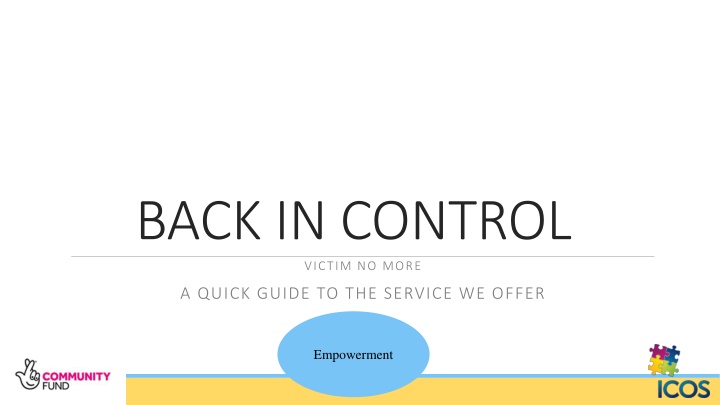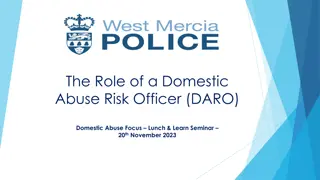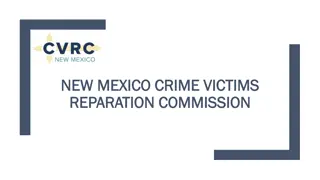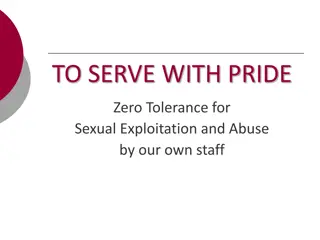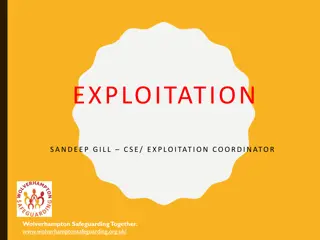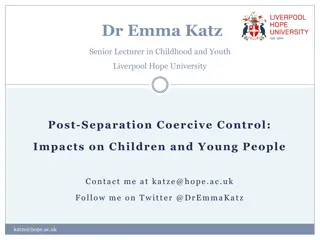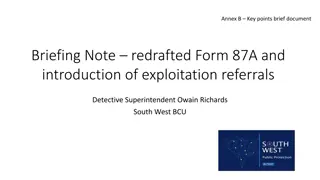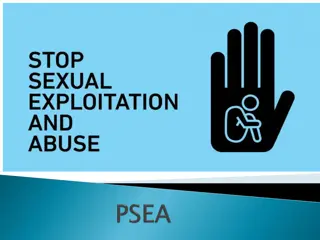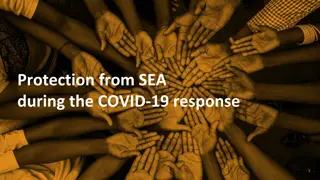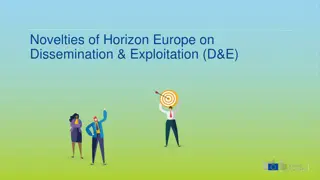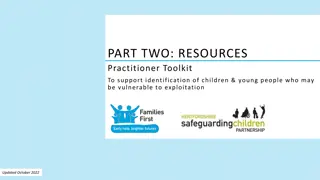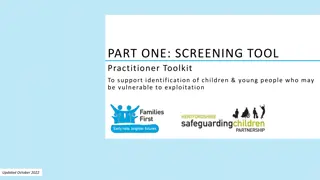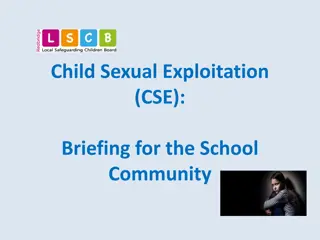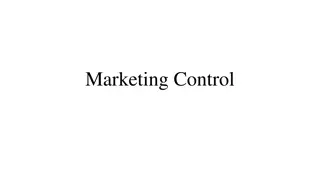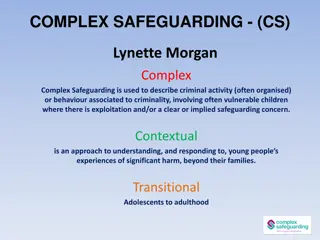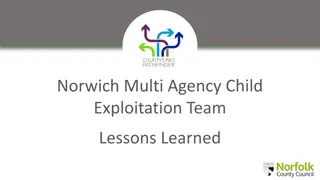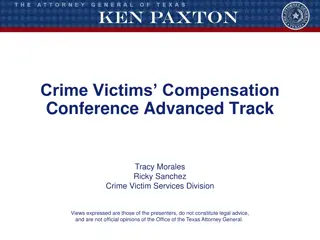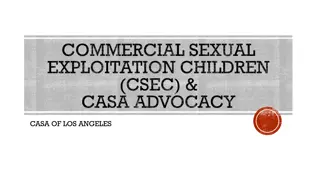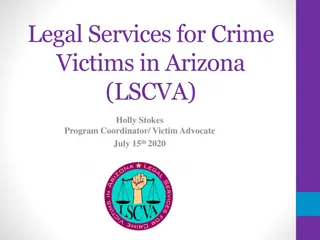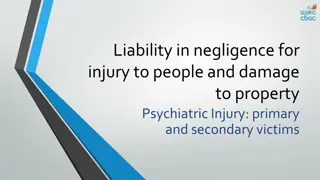Back in Control: Empowering Victims of Exploitation in Sunderland
The Back in Control project in Sunderland aims to support victims of modern-day slavery, domestic violence, and discrimination. By providing access to employment, increasing victims' resilience, and training organizations to recognize exploitation, the project seeks to empower victims and help them regain control of their lives. With a focus on engaging participants and capturing their experiences, the project aims to make a positive impact on the community over the course of three years.
Download Presentation

Please find below an Image/Link to download the presentation.
The content on the website is provided AS IS for your information and personal use only. It may not be sold, licensed, or shared on other websites without obtaining consent from the author.If you encounter any issues during the download, it is possible that the publisher has removed the file from their server.
You are allowed to download the files provided on this website for personal or commercial use, subject to the condition that they are used lawfully. All files are the property of their respective owners.
The content on the website is provided AS IS for your information and personal use only. It may not be sold, licensed, or shared on other websites without obtaining consent from the author.
E N D
Presentation Transcript
BACK IN CONTROL VICTIM NO MORE A QUICK GUIDE TO THE SERVICE WE OFFER Empowerment
Content 1. Context 6. The three-year programme 2. Aim 7. What we are going to achieve 3. How we will engage participants 8. About us 4. How we will achieve this 9. Project schematic 5. How the aims of the project will be measured 10. Contact
Context The Back in Control project is a three-year plan taking place between 2019-2022 and has been created by the International Organisation Community of Sunderland (led by people who are from the community they seek to represent) and in collaboration with several other organisations. At present people from the BME (Black and Minority Ethnic) groups residing in Sunderland are being exploited in the workplace and are victims of modern-day slavery.
Aims of the project The aim of the project is to support victims of modern day slavery, domestic violence and discrimination. Ensuring that the people who suffer from exploitation will have an increasing role in driving this project and become resilient and regain control of their lives. Providing the victims with improved access to employment. Victims will be able to regain control of their lives. Improved financial prospects for the victim Local organisations will be equipped in recognising when work place exploitation and slavery is taking place. New volunteers will be recruited and trained
70% of these will be work place exploitation victims. 30% Victims of modern slavery. 100% will be from Black and Minority Ethnical groups. 50% will be female 50% will be male. ICOS will work with 30 organisations by raising awareness regarding modern day slavery and workplace exploitation. Our training will help organisations achieve the Better Health at Work Award to take health and wellbeing into the workplace.
How we will engage participants Engage with clients in order for them to explore joining the Project Steering Group, along with volunteers and the Project Reference Group. Recruit participants who will receive support in accessing services. For example, housing and welfare. Capture participants experiences.
Capturing volunteers experiences Many Eastern Europeans, residing in Sunderland, have witnessed modern slavery, workplace exploitation and discrimination first-hand, they describe their ordeal in the interviews below: Maria (not her real name) discussed her experiences of being discriminated. You come to work, to get paid. We should be treat with dignity. It is like a vicious circle, the employee will not say anything because of fear of losing their job. On the other hand, the employer will use it to their advantage. People are basically scared; they should not feel ashamed. My previous manager treat me okay with recommendations made by my doctor when I was not feeling well. The deputy manager in the hotel where I work has been promoted to management. He is ignoring my doctor s recommendation. People are basically scared; they should not be ashamed. I have been off work due to ill health. When I return, they will mentally torture me and I will eventually be forced to leave. I am frightened I will be punished. The employer says he wants a healthy worker that is fit. This is discrimination. People are not willing to testify to support victims of workplace exploitation, they do not want to lose their jobs. ICOS, you are getting a good reputation, promoting your actions. I tell my friends about what good work ICOS is doing. I want to help other workers. Having these sessions is meaningful and purposeful for me. Many people believe that unions cannot help them. I am part of a trade union. Which ICOS helped her to join.
Capturing volunteers experiences Sonia (not her real name) says it is important to change people s perceptions, I work as a claims assistant and translate documents and it is a common occurrence to receive phone calls from people saying help me with discrimination, at least five times a day. When we have 5 accidents 3 will be discrimination related. If they claim for accident they are frightened they will be sacked. The employer forces worker to sign a form or never come back.
How we will achieve this Supporting victims and building their confidence, self-esteem in order, for them to lead independent lives. Ensuring victims are given a voice achieved through promoting cultural awareness and understanding. Encouraging the victim to reside in a place of their choice Encouraging the victim, if they wish to do so, to remain and reside in the United Kingdom. Improving point of contact and advice. Capturing their experiences to influence policy and practice Ensuring that victims are entitled to privacy and safeguarded.
Offering victims, holistic support. Providing meaningful and purposeful support as some victims had faced horrific abuse. Helping victims to become resilient by reporting the abuse and leaving the intolerable context they find themselves in. Offering advocacy support as this will enable to report crimes. Offering victims an initial skills support plan which outlines, objectives and how this will be measured in order for them to succeed. Referring victims to outside agencies to ensure they receive the support they require and follow up to ensure the transition is going smoothly. Utilising volunteers who will benefit from giving back to the community.
How the aims of the project will be measured The experience and learning will be recorded in reports, and in the final project report, which will be available on our website and distributed through our strategic partners. The Project Reference Group will be involved in this work and will scrutinise the materials to ensure the voices of project beneficiaries is heard.
The three-year programme Raising awareness of modern-day slavery and workplace exploitation issues Holding conferences and meetings. Designing advertisements and delivering partnership meetings in order to ensure everyone is aware of the project. The Project Steering Group (PSG): which include a target of 10 participants. Sharing collaborative practice with relevant partners in order to tackle slavery and workplace exploitation. Working closely with victims of exploitation. Organising themed events. Recruiting volunteers, who we expect will volunteer for at least 2-3 months.
What we are going to achieve Engage with beneficiaries to encourage them to access our support. We will manage the project effectively in order to ensure that a quality service is achieved. The project will involve between 140 beneficiaries.
About us Providing support to report changes of circumstances to benefit claimants so that they do not receive overpayments and penalties. We are a registered charity and has been running for the last 2009. Our purpose is to bring individuals and communities together. Helping families to register their children in school This in particular benefits the local community, minority and ethnic people. As an organisation we have supported many people who have experienced workplace exploitation. In November 2018 4 victims of workplace exploitation were interviewed. Some of the victims had also been physically abused. Focuses on working with Eastern Europeans; people from Poland, as well as refugees. As far as we are aware we are the only organisation in Sunderland working closely with victims of workplace exploitation. As an organisation we are able to organise consultations, conferences and events Primarily focusing on intercultural understanding and awareness. Provide free training and education both formal and informal. The organisation has organised various art and cultural projects. For example, the Meet your neighbour Festival and the Made in Poland Festival. Carrying out prevention by addressing issues as soon as possible in order for people to lead fulfilling lives. Offering Information, Advice and Guidance which other statutory providers do not offer any more an example being Healthy Steps or the Eastern European Support Project.
Project schematic ICOS Board (responsible body) Programme Steering Group Programme Reference Group Staff Team
Contact For more information and partnership opportunities please contact Michal Chantkowski, Project Manager: ICOS, 14 Foyle Street Sunderland Tyne and Wear SR1 1LE Telephone: 07596538482 michal@icos.org.uk
